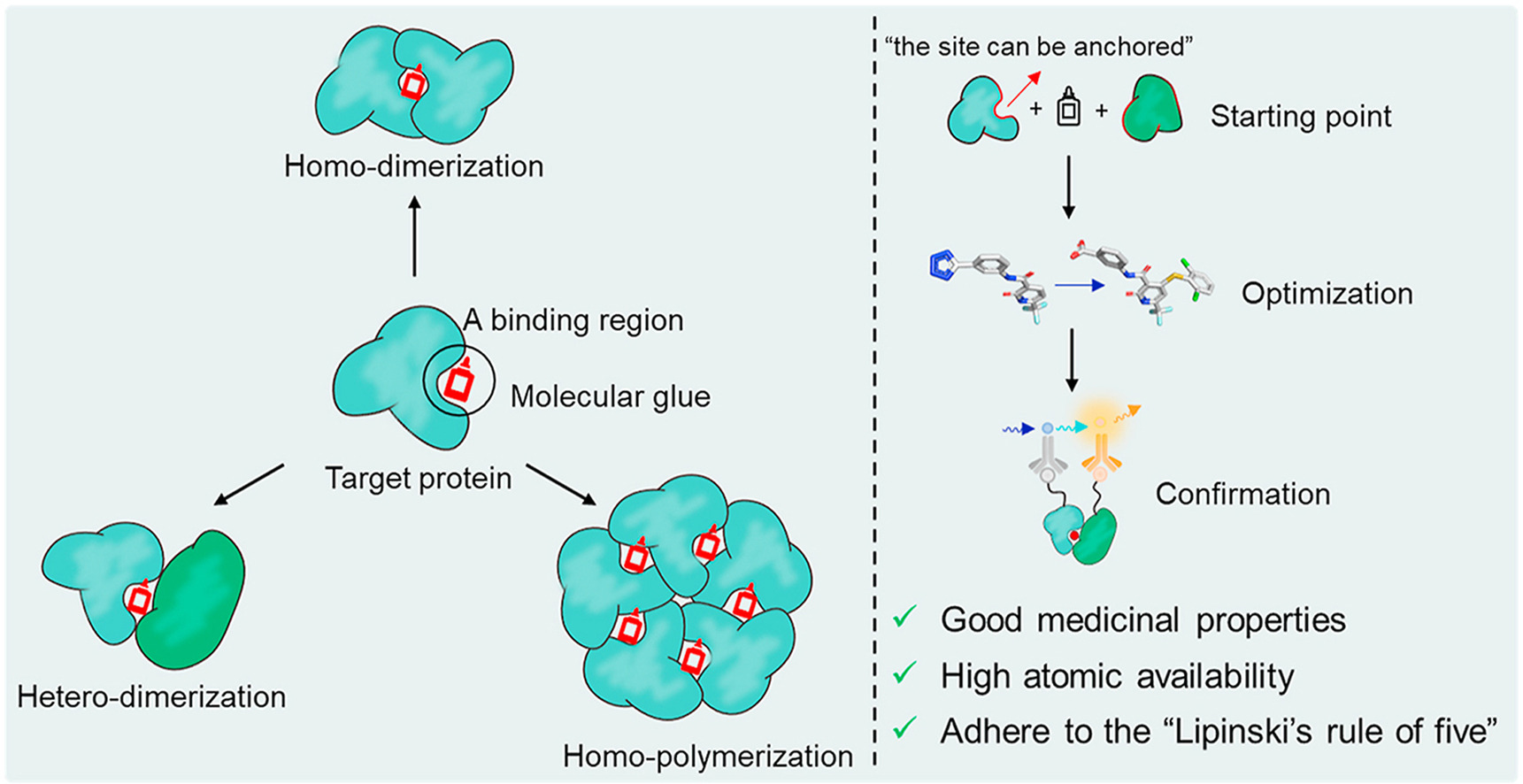Peptidomics-Based Molecular Glue Mechanism Research Service
Molecular glues are small molecules that regulate target protein functions by promoting protein-protein interactions. They have shown significant potential in targeting otherwise “undruggable” proteins, inducing protein degradation, and modulating protein complex assembly. Unlike inhibitors or PROTACs, molecular glues do not require a linker between the E3 ligase and the target protein. Instead, they exert their effects by stabilizing or inducing natural or novel protein interactions, achieving targeted action.
Peptidomics, an essential technique for studying endogenous peptides, plays a critical role in exploring protein degradation, cleavage, and regulatory dynamics under drug treatment. With the help of high-sensitivity mass spectrometry platforms, peptidomics can track key peptide expression changes, identify potential degradation patterns, and reveal alterations in protein interaction networks. These insights provide powerful support for validating the mechanisms of molecular glues and optimizing candidate molecule screening.

Wu, H. et al. Acta Pharm Sin B. 2022
Figure 1. Molecular Glue-Induced Protein Interaction Mechanism
MtoZ Biolabs offers Peptidomics-Based Molecular Glue Mechanism Research Service to support researchers worldwide in understanding the molecular mechanisms of molecular glues at the molecular level.
Technical Principles
Our Peptidomics-Based Molecular Glue Mechanism Research Service utilizes mass spectrometry-driven peptidomics analysis to monitor changes in endogenous peptide expression profiles, assisting in evaluating whether molecular glues induce specific protein-protein interactions or degradation of target proteins through the ubiquitin-proteasome pathway (UPS). Peptidomics data can also be used to trace cleavage site changes, cysteine/lysine modifications, and the effects of specific peptides on functional domains.
When molecular glues act on cellular systems, they typically activate specific protein interactions or protease activities, leading to the generation of new peptides or changes in the abundance of existing peptides. By comparing peptide profiles before and after treatment and combining qualitative and quantitative database analysis, we reconstruct the full peptide map of molecular glue action.
Services at MtoZ Biolabs
To meet diverse research needs in molecular glue mechanism studies, MtoZ Biolabs offers customizable analytical modules and full technical support, including:
1. Peptide Mapping in Response to Molecular Glue Treatment
Quantitative analysis of peptide expression changes across different time points following molecular glue treatment.
2. Protein Degradation Pathway Inference
Combining peptide localization and source protein data, we assess whether target proteins undergo selective degradation upon treatment.
3. Protein Interaction Network Analysis
Identifying novel protein complexes formed under molecular glue promotion by integrating peptide interaction profiles.
4. Post-Translational Modification (PTM) Detection
Monitoring phosphorylation, acetylation, ubiquitination, and other PTMs on key peptides to understand regulatory changes.
5. Integrated Mechanism Modeling
Reconstructing molecular pathways and regulatory models based on differentially expressed peptides.
Why Choose MtoZ Biolabs?
1. Advanced Analysis Platform: Equipped with Thermo Fisher Q Exactive HF and Orbitrap Fusion Lumos systems combined with Nano-LC, we ensure high-sensitivity detection of low-abundance peptides suitable for tracking subtle molecular glue–induced changes.
2. Broad sample compatibility: Compatible with cell lines, tissue homogenates, primary cells, and animal models to support a wide range of mechanism-of-action studies.
3. Dynamic Quantification: Using DIA or PRM-based approaches, we perform time-course and multi-condition quantification of peptide dynamics under molecular glue treatment.
4. High-Data-Quality: Deep data coverage with strict data quality control. AI-powered bioinformatics platform integrate all peptidomics analysis data, providing clients with a comprehensive data report.
5. One-Time-Charge: Our pricing is transparent, no hidden fees or additional costs.
FAQ
Q1: How can peptidomics be used to identify key peptides that promote or inhibit molecular glue formation?
We quantitatively compare peptidome profiles before and after molecular glue treatment and integrate protein domain annotations and interaction site predictions to identify key peptides involved in PPI interfaces, conformational stabilization, or E3 ligase recognition. These can serve as functional modules for designing glue-facilitating or anti-glue peptides.
Q2: What are the unique advantages of peptidomics in immune-related molecular glue research?
Molecular glue treatment may induce the release of atypical peptides and alter antigen presentation. Using immunopeptidomics analysis, MtoZ Biolabs can identify MHC-I–bound endogenous peptides and detect potential neoantigens or immunoactive peptides, thereby assessing immune activation effects and off-target risks. This approach supports the development of immunotherapy combinations and prediction of immune-related side effects.
What Could be Included in the Report?
1. Comprehensive Experimental Details
2. Materials, Instruments, and Methods
3. Total Ion Chromatogram & Quality Control Assessment
4. Data Analysis, Preprocessing, and Estimation
5. Bioinformatics Analysis
6. Raw Data Files
MtoZ Biolabs is dedicated to providing mechanism-driven, multi-omics solutions for molecular glue research. Our Peptidomics-Based Molecular Glue Mechanism Research Service complements proteomics and interactomics to help researchers uncover mechanisms of action, evaluate off-target effects, and validate target engagement. If you're developing or validating molecular glue candidates, we welcome you to contact us for personalized technical support and tailored study plans.
Related Services
Custom Molecular Glues Synthesis Service
Molecular Glue Screening Service | PROTAC Service
Peptidomics-Based Research Service
How to order?







